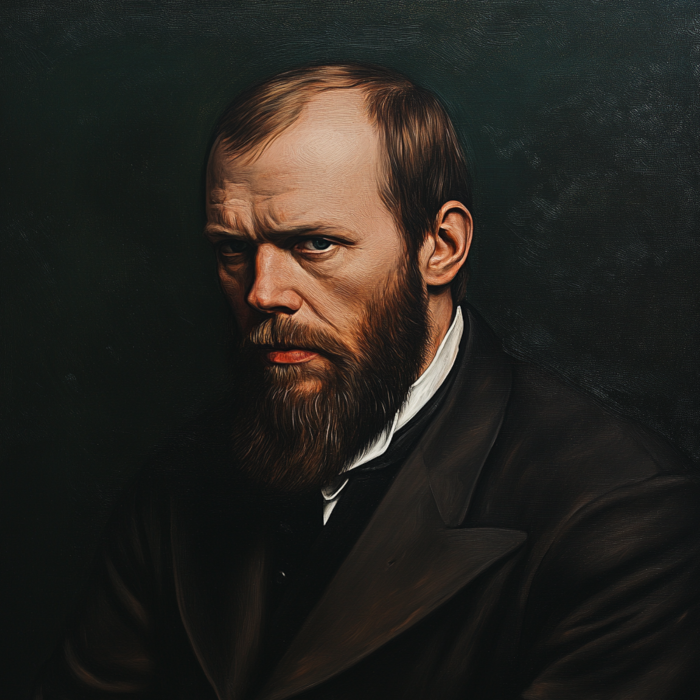
Fyodor Dostoevsky (1821-1881) was a Russian novelist, philosopher, and journalist, regarded as one of the greatest literary figures of all time. His work delved deeply into human psychology, exploring the moral, spiritual, and existential dilemmas faced by individuals in a rapidly changing society. Dostoevsky’s novels are celebrated for their complex characters, philosophical themes, and profound engagement with issues like faith, free will, suffering, and redemption. Below is an overview of his life and work:
Early Life and Background
- Birth and Family: Fyodor Mikhailovich Dostoevsky was born on November 11, 1821, in Moscow, Russia, into a middle-class family. His father, Mikhail Dostoevsky, was a physician at a charity hospital, and his mother, Maria Dostoevskaya, was a deeply religious woman.
- Education and Early Losses: Dostoevsky’s mother died when he was 15, and shortly thereafter, he was sent to Nikolayev Military Engineering Institute in Saint Petersburg. Dostoevsky was not particularly interested in military engineering and was more drawn to literature. During this time, he experienced the death of his father, which had a profound impact on him. His father was reportedly murdered by his own serfs, although the circumstances of his death remain uncertain.
Early Literary Career and Arrest
- First Novel - Poor Folk (1846): Dostoevsky’s first novel, Poor Folk, was published in 1846 and brought him immediate recognition. The novel, which was well received by critics, portrayed the struggles of impoverished individuals in Saint Petersburg and highlighted Dostoevsky's interest in social issues.
- The Petrashevsky Circle and Imprisonment: In 1849, Dostoevsky became involved with the Petrashevsky Circle, a group of intellectuals who discussed utopian socialism and criticized the Tsarist regime. The group was infiltrated by government informants, and Dostoevsky, along with others, was arrested for his participation.
- Mock Execution: Dostoevsky and his fellow prisoners were sentenced to death, but at the last moment, the sentence was commuted by Tsar Nicholas I. The prisoners underwent a dramatic mock execution, after which they were sent to Siberian labor camps. This experience had a profound effect on Dostoevsky, deeply shaping his worldview and his future literary themes.
Siberian Exile and Transformation
- Penal Colony: Dostoevsky spent four years in a Siberian penal colony followed by several years of compulsory military service. During his time in Siberia, he was exposed to the harsh realities of the prison system and the diverse personalities of his fellow prisoners. This experience profoundly influenced his understanding of human nature, particularly themes of suffering, faith, redemption, and the human capacity for good and evil.
- Return to Faith: During his time in prison, Dostoevsky re-embraced the Orthodox Christian faith, which became a significant element of his later works. His experiences of suffering, the interactions with other convicts, and his spiritual transformation gave him a new perspective on human nature, morality, and the redemptive power of suffering.
Major Works and Themes
Dostoevsky returned from Siberia in 1859 and began his most productive and influential period as a writer. His works during this time explore the psychological and philosophical depths of human nature, often focusing on troubled characters wrestling with existential and moral dilemmas.
Crime and Punishment (1866)
- Plot and Themes: Crime and Punishment follows the story of Rodion Raskolnikov, a former student who plans and executes the murder of a pawnbroker, believing that he is justified in doing so because of his intellectual superiority and the supposed benefits to society. However, he is soon overwhelmed by guilt and psychological torment, leading him to a journey of redemption.
- Moral and Psychological Exploration: The novel explores themes of morality, guilt, justice, and redemption. It raises profound questions about human nature, the value of life, and whether ends can justify means. It is celebrated for its deep psychological analysis of Raskolnikov's inner conflict and the moral consequences of his actions.
The Idiot (1869)
- Plot and Themes: The Idiot tells the story of Prince Lev Myshkin, a young man whose innocence, compassion, and goodness earn him the label of an "idiot" in the eyes of society. Myshkin returns to Russia after years in a Swiss sanatorium and becomes entangled in the complexities of love, jealousy, and greed among the Russian aristocracy.
- Exploration of Human Nature: Dostoevsky uses Myshkin as a Christ-like figure to explore how a truly good and selfless person would be treated in a flawed world. The novel examines the tension between idealism and the corrupting influence of society.
Demons (The Possessed) (1872)
- Plot and Themes: Demons (also known as The Possessed or The Devils) is a political novel exploring the rise of radicalism in Russia. It tells the story of a provincial town taken over by a group of nihilists who plan to incite chaos and violence. The novel is a critique of revolutionary ideologies that Dostoevsky saw as threatening to Russia.
- Critique of Radicalism: Through its portrayal of the destructive effects of radical thought, Demons addresses themes of ideology, faith, and the dangers of abandoning spiritual and moral values in favor of materialism and power.
The Brothers Karamazov (1880)
- Plot and Themes: The Brothers Karamazov is Dostoevsky’s final novel and is considered his masterpiece. It tells the story of the Karamazov family, particularly the three brothers—Dmitri, Ivan, and Alyosha—and their relationship with their lecherous and cruel father, Fyodor Karamazov.
- Faith, Doubt, and Free Will: The novel tackles some of the most profound philosophical questions, such as the existence of God, the nature of evil, free will, and the struggle between faith and doubt. The famous chapter "The Grand Inquisitor," in which Ivan imagines a conversation between Jesus and a church inquisitor, is one of the most important theological and philosophical passages in literature.
- Redemption: The character of Alyosha represents faith, love, and goodness, while Ivan embodies rationality and doubt, and Dmitri represents the struggle with passion and moral failings. Dostoevsky portrays the internal struggles of each character and their quest for redemption.
Later Life and Legacy
- Financial Struggles and Personal Hardships: Dostoevsky faced numerous challenges throughout his life, including financial struggles due to his compulsive gambling, which led him into debt. His first wife, Maria Dmitrievna, died in 1864, and he later married his stenographer, Anna Snitkina, who played an important role in supporting his literary career and managing his finances.
- Return to Prominence: Despite these hardships, Dostoevsky's later years saw a resurgence in his literary reputation. His works resonated with readers for their depth and realism, and he became one of the most celebrated writers in Russia. By the time of his death, he had gained widespread recognition for his literary contributions.
- Death: Dostoevsky died on February 9, 1881, in Saint Petersburg, after suffering from complications related to epilepsy and lung disease. His funeral was attended by thousands of admirers, a testament to the impact of his work on Russian society.
Influence and Impact
- Psychological Depth: Dostoevsky's exploration of the human psyche, moral dilemmas, and existential questions had a profound influence on literature, psychology, and philosophy. His characters’ intense emotional and moral struggles made his works some of the earliest examples of existential literature, influencing authors such as Franz Kafka, Albert Camus, and Jean-Paul Sartre.
- Existentialism: Dostoevsky is often considered a precursor to existentialist philosophy, as he delved deeply into questions about freedom, choice, and the meaning of life. His exploration of suffering, redemption, and the nature of good and evil resonated with existentialist thinkers and had a lasting impact on the development of the movement.
- Freudian Influence: Sigmund Freud considered Dostoevsky's insights into the human subconscious groundbreaking. His depiction of internal conflict and complex motivations anticipated many aspects of modern psychology.
Major Themes in Dostoevsky’s Work
- Good vs. Evil: Dostoevsky frequently explores the duality of good and evil within individuals, emphasizing the struggle between these forces in the human soul. His works often question whether people are inherently good or evil, showing the capacity for both within each person.
- Faith and Doubt: The tension between faith and doubt is a central theme in Dostoevsky’s work. His characters often wrestle with religious questions, and their spiritual journeys are essential to the plot.
- Redemption Through Suffering: Dostoevsky believed that true redemption and understanding of the human condition could only be achieved through suffering. His characters frequently experience intense psychological and moral suffering, which ultimately leads them to greater self-awareness and spiritual growth.
- Free Will and Moral Choice: Dostoevsky was deeply interested in the concept of free will and the moral choices that individuals face. His characters often grapple with questions about the consequences of their actions and the moral implications of their decisions.
Fyodor Dostoevsky remains one of the most important figures in world literature. His profound exploration of human psychology, morality, and spirituality has resonated with readers across generations. His works continue to be studied for their rich characterization, existential depth, and insightful portrayal of the human experience, making him a timeless and influential voice in literature.



